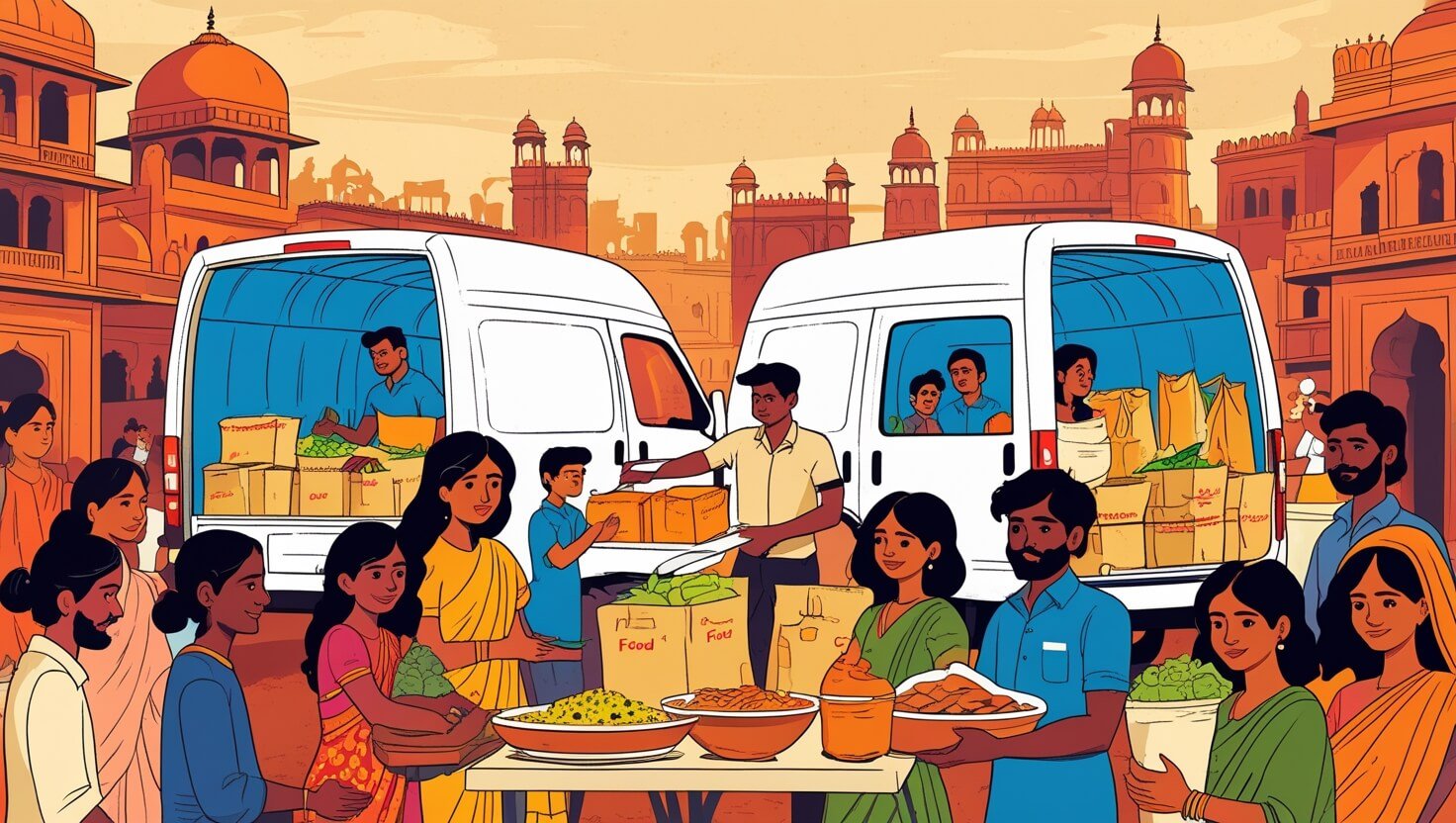Introduction
Understanding the food donation laws in India is essential to solving the country’s growing crisis of hunger and food waste. India, the second-largest food producer globally, faces a striking paradox: nearly 40% of food is wasted, while close to 40% of its population remains undernourished.
India faces a troubling paradox — it is the second-largest food producer in the world, yet a significant portion of its population remains undernourished. According to 2014 figures, India ranked 103rd out of 119 countries on the Global Hunger Index.
To address this alarming disparity, the Indian government has taken proactive steps to formalize food recovery systems through legal means. The Food Safety and Standards Authority of India (FSSAI) has introduced structured regulations to building on the larger concept of food redistribution and its importance.
And to promote food donation, reduce waste, and support hunger relief. In this blog, we’ll explore the food donation laws in India, what they mean for donors, and how they help bridge the gap between surplus and scarcity.
FSSAI’s Role in Creating Food Donation Laws in India
One of the most significant legal milestones in this area is the introduction of the Food Safety and Standards (Recovery and Distribution of Surplus Food) Regulations, initially drafted in 2019 and officially implemented in 2021.
These laws aim to:
- Create uniform national guidelines for food donations
- Offer legal protection to individuals and organisations donating food in good faith
- Build a nationwide culture of safe and structured food donation
- Support Sustainable Development Goals (SDGs) by reducing food waste and hunger
FSSAI’s initiative, branded as “Save Food, Share Food, Share Joy”, supports the collection and safe distribution of surplus food from food businesses to NGOs and the needy.
Originally slated to begin in July 2020, implementation was postponed to January 2021 due to the COVID-19 pandemic. This flexibility demonstrates FSSAI’s commitment to both safety and practicality in regulatory enforcement.
Key Requirements Under Food Donation Laws in India for SFDOs
To ensure the safe and effective donation of food, the FSSAI’s food donation laws in India lay out a clear regulatory framework for Surplus Food Distribution Organisations (SFDOs). These are non-profits or organisations responsible for collecting, storing, and distributing donated food to beneficiaries.
Here are the core legal and operational requirements SFDOs must follow:
1. Mandatory FSSAI Registration
All SFDOs must register with the FSSAI’s food licensing portal. This registration ensures they operate under regulatory oversight, which enhances transparency and enforces accountability.
2. Strict Food Safety and Hygiene Compliance
SFDOs must follow the Food Safety and Standards (Licensing and Registration of Food Business) Regulations, 2011. This includes:
- Safe handling of perishable and non-perishable items
- Hygienic storage conditions
- Proper labeling and segregation of food items
This step is critical to avoid any health risks, especially since donated food can have a limited or uncertain shelf life.
3. Appropriate Infrastructure for Safe Handling
Organisations are required to maintain proper infrastructure, such as:
- Refrigerated storage
- Clean transport vehicles
- Facilities for reheating or serving food
This ensures the food remains uncontaminated and safe from collection to distribution.
These requirements ensure that organisations comply with all relevant food donation laws in India, building trust across the donation network.
4. Detailed Record-Keeping
All surplus food received and distributed must be systematically recorded. These records help:
- Maintain traceability
- Monitor food safety practices
- Support regulatory inspections and audits
5. FSSAI-Regulated Food Serving Practices
SFDOs that serve food directly to the needy are also regulated under these laws. This means:
- The act of serving food must meet food safety standards
- Volunteers and handlers must follow health and hygiene protocols
6. Monitoring Committee Oversight
A Monitoring Committee has been established by FSSAI to:
- Review SFDO operations
- Recommend best practices
- Conduct training for food handlers on hygiene and safety
This committee plays a crucial role in capacity-building and maintaining compliance at all operational levels.
7. Clear Guidelines for Expiry-Date Management
To minimize waste, FSSAI has issued clear rules for:
- When food nearing expiry should be set aside for donation
- How to handle food close to its expiry date
This ensures food is recovered before it becomes unfit for consumption.
8. Comprehensive Distribution Guidelines for SFDOs and FBOs
Both Food Business Operators (FBOs) and SFDOs must follow standardized guidelines for:
- Food collection
- Storage
- Distribution
These guidelines ensure food safety at every touchpoint, from the donor’s kitchen to the recipient’s plate.
Food Donation Laws in India: Compliance Rules for Food Business Operators (FBOs)
The food donation laws in India place initial responsibility for food safety on the donor — ensuring what’s passed on is fit for consumption.
Food Business Operators (FBOs) — including restaurants, food manufacturers, caterers, and supermarkets — are the primary sources of surplus food. Under the Food Safety and Standards (Recovery and Distribution of Surplus Food) Regulations, 2021, FBOs must follow specific legal responsibilities when donating food to ensure safety, traceability, and accountability.
Here are the key compliance obligations for FBOs:
1. Responsibility to Ensure Food Safety at the Source
FBOs are legally obligated to donate only food that is safe for human consumption. This means:
- Surplus food must not be spoiled, contaminated, or expired
- The donor bears the responsibility for the initial quality check
This provision is crucial, as it prevents unsafe food from entering the distribution chain and protects both recipients and SFDOs.
2. Labeling Requirements for Donated Food
FBOs must comply with labeling guidelines based on the type of food:
- Pre-packed food must carry clear labels with expiry/use-by dates and storage instructions
- Cooked or prepared food must be accompanied by details such as preparation time and consumption timelines
FSSAI’s Packaging and Labelling Regulations now include clear distinctions between:
- “Best Before” (quality)
- “Use By” (safety) dates
This clarity helps SFDOs make informed decisions about handling and serving donated food.
3. Broad Applicability of the Law
The Surplus Food Regulations apply to any person or entity that donates food which:
- Is leftover, unused, and safe
- Has not been served to customers
This wide coverage ensures that food from weddings, corporate events, hotels, canteens, and factories can be legally and safely recovered — instead of going to waste.
Together, these rules not only protect end consumers but also build a transparent and trust-based system between FBOs and SFDOs.
Legal Gaps and Opportunities in Food Donation Laws in India
While India’s food donation laws represent a meaningful step forward, there are still policy and legal gaps that need to be addressed. Closing these gaps could significantly improve the scale, safety, and sustainability of food recovery operations across the country.
Below are some key concerns and corresponding opportunities:
1. Lack of Federal Liability Protection
Current Situation:
India currently lacks federal-level legal protections for food donors and food recovery organisations (like SFDOs).
Why It Matters:
This creates legal uncertainty. Even if donors act in good faith and follow all safety protocols, they may still fear potential litigation if recipients experience any adverse effects. This fear discourages many potential donors from participating.
Global Best Practice:
The U.S. has the Good Samaritan Food Donation Act, which protects donors from liability when they donate food in good faith to non-profit organisations.
Recommendation:
India should consider similar national legislation to limit donor liability, provided the food:
- Meets safety regulations
- Is donated without charge
- Goes to a registered non-profit
Such protections would boost donor confidence and encourage wider participation.
2. Lack of Clear Tax Incentives
Current Situation:
India currently offers no explicit tax incentives for food donation. There’s also confusion regarding the applicability of GST on donated food, especially by food businesses.
Why It Matters:
- Businesses may hesitate to donate due to the unclear tax implications
- No financial benefits exist to offset logistics or handling costs
- Administrative confusion around GST adds a perceived burden
Recommendation:
- The government should introduce targeted tax benefits for food donations to registered SFDOs or food banks
- Clear GST exemptions on donated food would remove ambiguity and promote compliance
This would help make food donation not just socially responsible — but also financially feasible.
3. Lack of Government Grants and Public Incentives
Current Situation:
There is currently no federal funding, grants, or national recognition programs for food recovery initiatives in India.
Why It Matters:
- Many SFDOs and food banks operate with minimal infrastructure and limited budgets
- Without government support, they struggle to expand outreach or invest in cold storage, vehicles, or food safety training
Opportunity:
The government can play a pivotal role by:
- Offering public grants and capacity-building funds
- Launching recognition and certification programs to encourage innovation and excellence in food recovery
- Partnering with NGOs and corporates to create a co-funded donation ecosystem
The Broader Impact of Food Donation Laws in India
The regulatory initiatives led by the FSSAI are not just administrative reforms — they are part of a larger mission to combat hunger and reduce food waste at a national scale. The food donation laws in India are helping to build a more equitable, efficient, and socially responsible food system.
Here’s how these regulations are making a real difference:
1. Combating Hunger and Food Insecurity

By providing a legal and safe framework for donating surplus food, these laws ensure that nutritious meals reach those who need them most — including children, low-income families, migrants, and vulnerable communities.
They directly support India’s fight against hunger by mobilising untapped food resources from restaurants, events, and retail outlets.
2. Reducing Food Waste at the Source
India produces more than enough food to feed its population, yet millions of tonnes go to waste annually. These regulations:
- Encourage businesses to recover and donate food nearing expiry
- Provide infrastructure and compliance clarity to do so safely
- Support sustainability goals by reducing environmental impact
This transforms waste into a social good, promoting responsible consumption.
3. Building a Culture of Sharing and Community Responsibility
The regulations aim to mobilise citizens, businesses, and NGOs to work together in a structured way. This collaborative ecosystem is further supported by the Indian Food Sharing Alliance (IFSA) — a national network of:
- Food recovery agencies
- Safety training bodies
- Regulatory liaisons
IFSA provides essential resources, capacity-building programs, and compliance support to ensure India’s food recovery efforts are sustainable, scalable, and safe.
Challenges and the Road Ahead for Food Donation in India
While the regulatory framework has laid a solid foundation, India’s food donation ecosystem still faces logistical, awareness, and operational challenges. Overcoming these barriers will be key to making food recovery a mainstream, sustainable solution.
Current Challenges
1. Complex Logistics
- Coordinating collection, transport, and storage — especially for perishable food — is still a significant hurdle.
- Many recovery organisations lack cold chain infrastructure, causing delays and potential spoilage.
2. Lack of Awareness
- Many food businesses, event organisers, and individuals don’t know how or where to donate food.
- On the flip side, recipients often remain unaware of available food banks or distribution points.
To address this, the FSSAI’s ‘Save Food, Share Food, Share Joy’ initiative and the Indian Food Sharing Alliance (IFSA) continue working to build bridges between donors, distributors, and beneficiaries via centralised platforms and awareness campaigns.
Future Trends in Food Donation
1. Rising Public Awareness
- Schools, social media influencers, and corporate campaigns are playing a growing role in educating the public about food waste and donation options.
2. Stronger CSR-Based Partnerships
- Companies are increasingly integrating food donation into their CSR and ESG strategies, partnering with NGOs to institutionalise giving.
3. Smarter Logistics and Tech Integration
- Innovations like real-time tracking, mobile apps, smart fridges, and AI-based inventory tools are expected to improve donation efficiency.
- These tools will enable faster, safer food redistribution, reducing spoilage and resource waste.
4. Sustainable Food Donation Practices
- Future food recovery efforts will focus on:
- Reducing packaging waste
- Donating organic or minimally processed foods
- Supporting a circular food economy
This aligns food donation with broader climate and sustainability goals.
Conclusion
The Food Safety and Standards (Recovery and Distribution of Surplus Food) Regulations represent a major step forward in India’s fight against hunger and food waste. By setting clear guidelines for donors and distribution organisations, the FSSAI has established a reliable and ethical food donation framework.
However, India must now go further — with legal protection, financial incentives, and government support — to unlock the full potential of food recovery. By doing so, we can create a future where no food is wasted, and no one goes hungry.
Are you a business looking to donate surplus food or an NGO looking to collaborate?
Join hands with Reshine Organisation today.
Be part of a transparent, safe, and impactful food recovery network working across India to reduce waste and feed hope.


